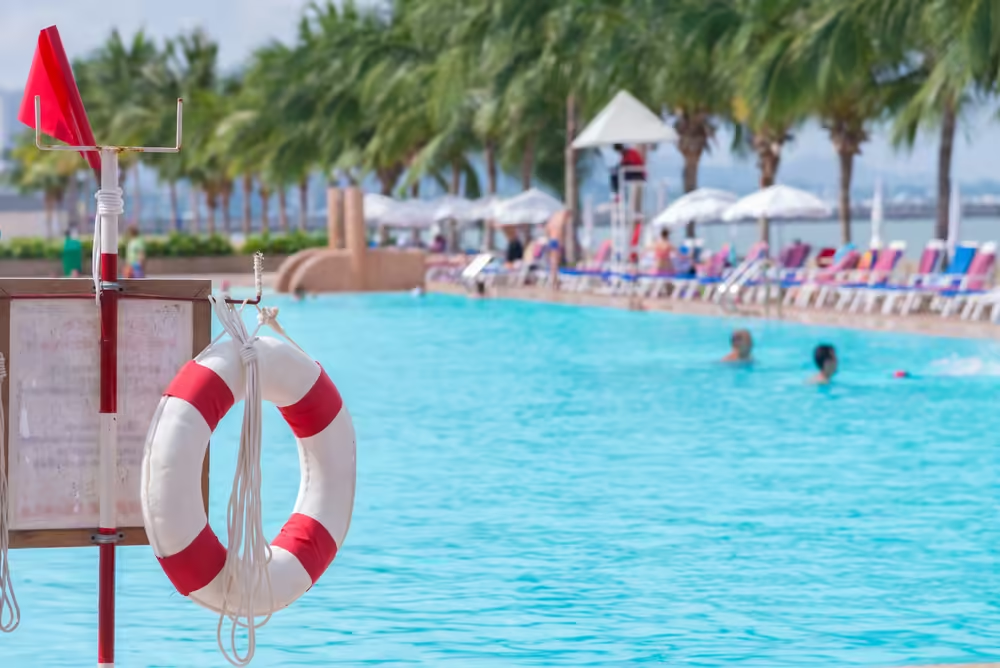Water Safety in Spain: A Comprehensive Guide
As temperatures rise and people flock to pools and beaches across Spain, water safety in Spain becomes a critical concern. This summer, the country has already seen a troubling number of drownings, highlighting the importance of taking proper precautions. Whether you’re enjoying a private pool or the beautiful Spanish coastline, adhering to water safety guidelines can prevent tragedies and ensure a fun and safe experience for everyone.
Pool Safety: A Necessity, Not a Luxury
Constant Supervision
Never leave a child unattended near a pool, even for a moment. Designate a responsible adult as a water watcher. Vigilant supervision is the most effective way to prevent accidents.
Secure Perimeter
Ensure your pool is completely enclosed by a fence with a self-latching gate to prevent unauthorized access. This is a legal requirement in many parts of Spain and a crucial step in preventing accidental drownings.
Swimming Proficiency
Learning to swim is a vital life skill. Enroll children in swimming lessons as early as possible to build their confidence and ability in the water.
Cover When Not in Use
Always cover your pool when it is not in use to prevent accidental drownings. This simple measure can save lives.
Emergency Preparedness
Have essential emergency equipment, such as a life ring and first aid kit, readily available near the pool. Knowing where these items are can make a critical difference in an emergency.
Proper Maintenance
Regular pool maintenance is essential to prevent accidents and illnesses. Ensure the water is clean, and all pool equipment is in good working order.
Beach Safety: Respect the Sea
Swim in Designated Areas
Only swim in areas supervised by lifeguards. Obey beach flags and warning signs to stay informed about current water conditions.
Buddy System
Never swim alone. Always have a trusted companion with you to ensure mutual safety and assistance if needed.
Assess Your Abilities
Understand your swimming limitations and avoid overestimating your capabilities. The ocean can be unpredictable and challenging.
Understand Ocean Conditions
Be aware of rip currents, tides, and wave patterns before entering the water. Knowledge of these conditions can help you avoid dangerous situations.
Sun Protection
Shield yourself from the sun’s harmful rays by wearing sunscreen, a hat, and sunglasses. Sunburn can ruin a day at the beach and lead to long-term skin damage.
Marine Life Awareness
Be cautious of marine life and avoid disturbing their habitat. Some creatures can be dangerous if provoked.
Weather Vigilance
Monitor weather conditions and exit the water if a storm approaches. Lightning and rough seas can pose significant hazards.
General Water Safety Guidelines
Inflatable Device Caution
While inflatable devices, such as floaties, inflatable rings, or pool toys, can be enjoyable to use in the water, they should not be relied upon as life-saving equipment. These devices are not designed to provide the necessary buoyancy and support in an emergency situation.
Alcohol Impairment
Avoid alcohol consumption before and during water activities as it impairs judgment and coordination, increasing the risk of accidents.
Cold Water Risks
Cold water can induce shock, making swimming difficult. Enter the water gradually to acclimatize your body and reduce the risk of shock.
Muscle Cramps
If you experience a muscle cramp, remain calm and float on your back until it subsides. Panicking can exacerbate the situation.
Emergency Response Training
Learn CPR and basic water rescue techniques to be prepared for emergencies. This knowledge can be life-saving.
Specific Safety Measures for Children
Diaper Precautions
Never allow toddlers to wear disposable diapers/nappies around water. Opt for swim diapers or pull-ups designed for aquatic use to maintain hygiene and safety.
CPR Proficiency
Parents and caregivers should be CPR-certified to respond effectively in emergencies. Immediate action can save a child’s life.
Flotation Device Limitations
While flotation devices can offer assistance, they should never replace adult supervision. Always watch children closely when they are in or near water.
Secure Pool Environment
Ensure your pool area is completely enclosed and inaccessible to children when unattended. This prevents unsupervised access and potential accidents.
Swimming Lessons
Enroll children in swimming lessons early to develop water confidence and skills. This education is essential for their safety.
Emergency Contact Information
Know the emergency number for Spain (112) and teach it to your children. Quick access to emergency services is vital in critical situations.
Visible Swimwear
Dress children in bright-colored swimsuits to enhance visibility in the water. This makes it easier to spot them and ensure their safety. Avoid blues and greens that are difficult to see in the water.
Conclusion
The high number of drownings reported this summer in Spain is a stark reminder of the importance of water safety in Spain. By following these comprehensive guidelines for pools, beaches, and general water activities, you can significantly reduce the risk of accidents and ensure a safe and enjoyable experience for all. Prevention is the best protection, and with careful planning and vigilance, you can keep your loved ones safe in and around the water.
Do you have any more tips or advice regarding water safety?
Let us know what you think in the comments…
Thank you so much for your support! Reach out to us on Facebook and Instagram
For those interested in relocating to Spain we have created a Facebook Group How to Move to Spain to help you throughout the process. We will provide helpful free printables to keep you on track, online events to inform and support your journey, and above all create a community where you can ask questions and get advice. Please feel free to join!
Share this content:




3 comments